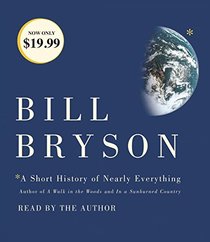Helpful Score: 5
Fascinating!! This book was great. For someone like me who hasn't really studied any science since high school (many years ago), Bryson provides a great history of the earth and science through the ages that is written so anyone can understand it. It's amazing to me how many scientific principles have changed and theories introduced since I took high school physics in the 60s. There are so many interesting and fascinating facts in the book. It really makes me want to learn more about some of the specific areas. The quibbling among scientists such as the early discoverers of dinosaurs was great. The parts about dangers from space and the Earth itself were frightening: the possible future collision with a comet or asteroid, the inevitable huge earthquakes and volcanic activity, the possible ice ages, etc. And the insights into some of the great scientists personalities and eccentricities were marvelous. The part about the retiring scientist Henry Cavendish and his shyness was priceless. I would highly recommend this to anyone who wants to get a broad perspective on the sciences. I wish my grade school teachers could have made science this interesting.
Jennifer E. (sircecilseltzer) reviewed A Short History of Nearly Everything (Audio CD) (Abridged) on + 22 more book reviews
Helpful Score: 4
This is, without a doubt, the first book that should be read if you are interested in science but you're not sure where to begin.
Laurie H. (lah) reviewed A Short History of Nearly Everything (Audio CD) (Abridged) on + 37 more book reviews
Helpful Score: 4
This book is quite different from Bryson's usual fare. Here Bryson steps out of his usual travel and language focus to write about science. The product is an interesting combination of the social history of science, biographies of famous scientists, and discussion of significant scientific discoveries in very accessible language. What science does Bryson cover, you might ask? This is where "everything" comes in to the picture. Bryson has chosen a wide range of scientific discoveries, from working out the theory of evolution to discovering the size and shape of the earth. Mostly, Bryson focuses on the largest and smallest things in the universe. He looks at galaxies and volcanoes, but also DNA and atoms. Truly, this book is expansive. For the lay reader, it becomes clear that there's a tremendous amount of knowledge tied up in this book, and it's amazing just how much Bryson had to learn to write it. For the non-scientist, this book manages to create a sense of awe, wonder, and fear, all at the same time. Bryson does an excellent job of highlighting just how surprising and contingent the fact of our existence is, and how complicated it was to get here. He creates amazement as the reader is forced to consider almost unfathomable dimensions, both gargantuan and tiny. Contingency is clearly the most significant theme that emerges from the work. Bryson also paints an interesting portrait of the practice of science, scientific culture, and a sense of just how difficult and tenuous some conclusions are. While it's amazing just how much scientists have discovered, it's even more daunting to consider how much remains inconclusive. Overall, this is an extremely accessible discussion of some difficult topics, infused with Bryson's humor and style. It's a long read, but well worth the effort.
Helpful Score: 2
Wonderful book, written in "layman's terms", which means there's more biographies of 19th century scientists than I like, but he does manage to put in a lot of science, and also give a lot of the sense of uncertainty in the scientific evidence. Lots of good etymological (word origin) information (for instance, I now know where the phrase "cloud nine" came from [hint, there's probably a "cloud eight" and a "cloud ten"]). There's a lot of "if the earth was the size of a grain of sand, then theres...." and "if the time that humans were on earth was 1 second, then the trilobites...."
Helpful Score: 1
This had to be the best book I've ever read on how the earth and solar system were created (or became). It has a lot of "big words", but the author kept me interested. I couldn't put it down. I wanted to read more and more about how our earth evolved and how man, as we know him, came to be. He talks about huge numbers and trillions of years, but he doesn't get you lost in the fine details, though there are lots to digest.





